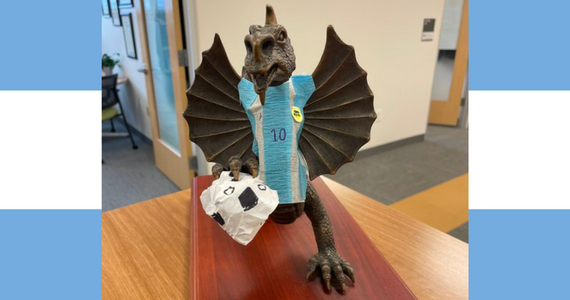What the Beautiful Game Can Teach Us About Life
Posted on
December 19, 2022
 The Mario the Dragon statue in the Dean's suite sports an Argentina jersey during the World Cup.
The Mario the Dragon statue in the Dean's suite sports an Argentina jersey during the World Cup.
By Dean Ana V. Diez Roux, MD, PhD, MPH
Being from Argentina, and descending from a long line of “fútbol” enthusiasts (the often beleaguered San Lorenzo de Almagro is our team…), this month I cannot avoid talking about “the beautiful game.” I have watched the games at home, in bars, at the Urban Health Collaborative (thank you Diana and Gianna for the organization and Larry for the IT support!), and even tracked one game on my phone during a meeting at the National Academies of Sciences… (I was not the only one). And yesterday I agonized, texting and video conferencing my family across three continents until finally, after a nail-biting end, Messi and his team did it, and the country as well as Argentinians across the globe erupted into ecstatic celebration. At long last a hope fulfilled, at long last something to celebrate.
Of course, entertaining as it is, “fútbol” is entwined with things both good and bad in our society. Violence, homophobia, racism, and sexism often characterize interactions between fans, players, and coaches. The game is entwined with politics, money, and corruption. The President of one of the most famous teams in Argentina (Boca Juniors) became President of the country a few years ago. Violence at matches can trigger aggression outside the field as starkly illustrated by the famous case where violence at a soccer game precipitated the so called “100 Hour War” between El Salvador and Honduras in 1969. During a time, Argentina completely banned fans at games because of the levels of hostility and violence.
This year’s World Cup in Qatar was marred by stories of corruption, by the deplorable treatment of migrant workers who built the stadiums, and by anti-LGBTQ+, anti-immigrant, and sexist policies of the host country causing many to call for a boycott. The organization that organizes the World Cup (FIFA) has long been embroiled in controversies related to vote rigging and bribes. Yet, despite all this, I have to recognize that at its core there is something undeniably special about the World Cup, something about countries rich and poor and large and small coming together across the globe to play a game, a game with simple rules where, in contrast to many other international interactions, anybody can win.
The “beautiful game” permeates the Argentinian psyche. We routinely use soccer references and metaphors in our daily interactions. For example, a common expression is “no me dan pelota,” literally “no one gives me the ball” but used to mean “no one pays attention to me”. When referring to a great success or triumph, Argentinians say “fue un golazo,” literally “what a great goal.” Perhaps what makes this simple game so enthralling to watch for many is that it somehow captures in a stylized way many of our feelings and interactions in life. Isn’t that after all what many games we play are about?
There is a wonderful concept in soccer called “the assist.” According to an online definition “assists are awarded to a player who makes the final pass or cross before a goal is scored. An assist is given even if the pass is unintentional. This means that this pass could be an inadvertent touch, as long as it is the final one before the goal is scored.” An assist unselfishly creates an opportunity. Instead of trying to do something on their own, the “assister” sets it up so that someone else can complete.
A beautiful thing about the assist is that it is something simple, even perhaps unintentional, and easy to miss, but that makes a huge difference. In contrast to soccer (where assists are meticulously tracked) assists in life usually go unrecognized. And yet they happen all over the place. In my job I see them every day, assists large and small, that make an enormous difference.
As the year 2022 comes to a close (and it has been a hard one), I want to thank all of you for so many silent “assists” over the course of this year. Without these assists there would be no goals. Assists show us how and why collective action can be so powerful, and why it is so crucial to public health and more generally to the well-being of our society.
And in case you are interested, the player with the most assists (of course this being fútbol the statistics are hotly debated…) is Lionel Messi (from Argentina in case you didn’t know…) with over 350 assists. But don’t just believe me, watch his most beautiful assist in the game against Croatia just last week here.
As I write, Argentinians in Buenos Aires and across the country are flooding the streets, cheering. I can see them on the Whatsapp videos my family sends me, and I wish I were there… As Argentina’s win yesterday aptly demonstrated (3 goals each plus 30-minute overtime and a penalty shootout...), the game is not over till it’s over. Have a wonderful winter break. And when you are back, whatever your “goals” are, return refreshed to stay in the game, to persist and regroup in the face of adversity. May 2023 bring opportunities to give and receive more “assists” in fútbol and in life, and give us all cause for celebrations large and small.